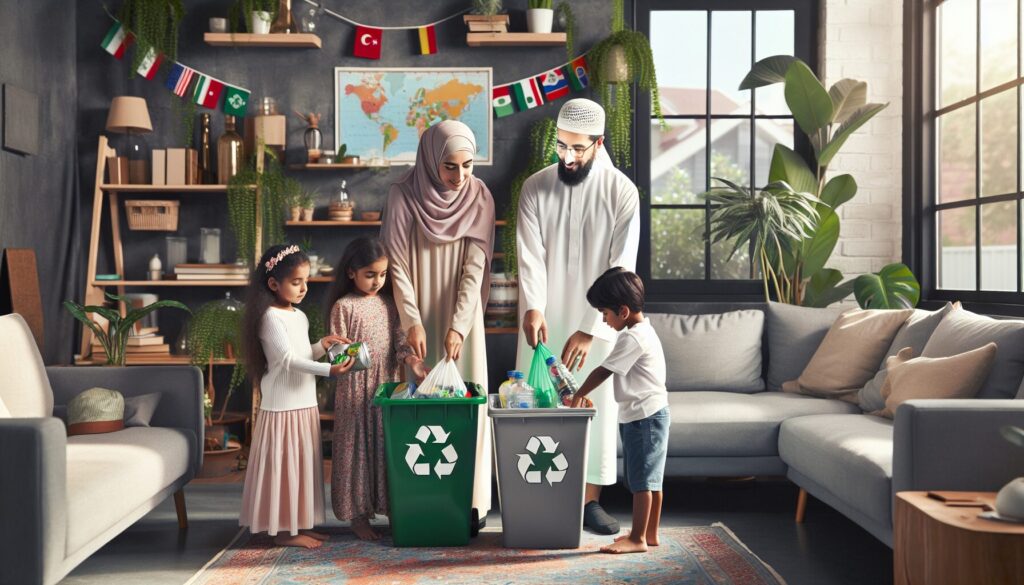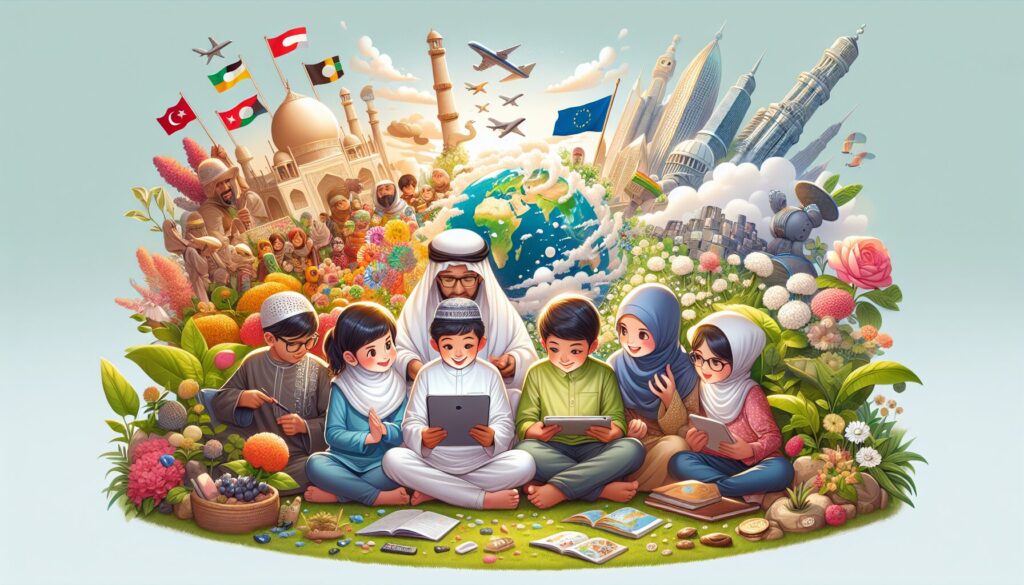Growing up, I remember my grandmother telling me stories of the Prophet Muhammad’s (peace be upon him) deep love for nature. She’d say, “He taught us to cherish every tree and creature as a blessing.” Those stories stuck with me, and now, as a parent, I try to instill that same appreciation in my kids. The beauty of Islamic teachings is that they’re inherently eco-conscious. They emphasize stewardship, where humans are seen as caretakers of the Earth. This concept is known as Khilafah—a duty to protect and nurture the environment. Moreover, there’s a strong emphasis on avoiding waste, aligning perfectly with today’s need for sustainability. So, whether it’s conserving water during ablution or planting trees, these principles offer a rich framework for raising environmentally aware children in 2025.
Incorporating Green Practices in Daily Life

When it comes to incorporating green practices into daily life, it’s all about making small, meaningful changes that add up over time. As parents, we can teach our kids to be environmentally conscious by weaving these habits into our everyday routines. Imagine family dinners where everyone gets involved in sorting recyclables or weekend gardening sessions where you plant herbs and veggies together. These are the moments that build a green mindset in our kids.
Let’s dive into some practical ways to bring green practices into daily life:
- Reduce, Reuse, Recycle: This classic mantra is more relevant than ever. Encourage your kids to think twice before tossing items away. Can that glass jar be repurposed as a flower vase? Or could those old t-shirts be transformed into cleaning rags? Engaging kids in these activities can make them feel like eco-heroes!
- Energy Conservation: Teach kids the importance of turning off lights when they leave a room and unplugging devices when not in use. These small actions can significantly reduce energy consumption. Plus, it can be a fun game to see who saves the most energy each month!
- Water Conservation: Simple habits like turning off the tap while brushing teeth or taking shorter showers can make a big difference. You can even make it a challenge to see who can use the least amount of water in a week.
- Eco-Friendly Products: Choose biodegradable and organic products whenever possible. From cleaning supplies to clothing, opting for eco-friendly products is a fantastic way to lead by example. Look for certifications from organizations like Green Seal or Energy Star.
- Local and Organic Foods: Support local farmers by visiting farmers’ markets with your kids. This not only helps the environment by reducing transportation emissions but also teaches kids about where food comes from. Plus, it’s a great way to spend quality time together and perhaps meet a few farmers!
Creating Green Spaces at Home
Transforming your living space into a green haven is easier than you might think. Start by introducing houseplants. They’re not just pretty; plants like spider plants and peace lilies can purify the air. Encourage your kids to take care of these plants, teaching them responsibility and the importance of nature.
Additionally, try growing a small vegetable garden if you have the space. Even if it’s just a windowsill herb garden, getting kids involved in planting, watering, and harvesting can be incredibly rewarding. It connects them to the food they eat and the cycle of life.
Consider starting a compost bin. It’s a wonderful way to teach kids about waste reduction and nutrient cycling. Plus, it gives them a chance to see nature’s recycling process up close. You can even make it a family project to track how much waste you’re diverting from the landfill.
Incorporating these practices not only helps the environment but also instills values of stewardship and responsibility in our children. By making these small changes, we’re not just raising kids; we’re nurturing future leaders who will care for our planet. For more ideas and support on this path, organizations like the Islamic Foundation for Ecology and Environmental Sciences offer excellent resources.
Educational Resources for Eco-Friendly Learning
Oh, the joy of seeing young minds light up with curiosity and wonder! There’s something so magical about nurturing our little ones to be eco-conscious citizens of the world. As we look toward raising green Muslim kids in 2025, it’s crucial to have the right educational resources at our fingertips. Let’s dive into some fantastic options that can guide our children on this enlightening journey.
Firstly, online platforms have truly revolutionized learning. Websites like Islamic Foundation for Ecology and Environmental Sciences offer a plethora of resources that blend Islamic teachings with environmental consciousness. They provide articles, interactive modules, and even games that engage children in a fun and meaningful way. Additionally, exploring eco-themed storybooks that highlight environmental stewardship through Islamic values can be incredibly impactful.
Interactive Workshops and Community Events
Community events and workshops are another great avenue for eco-friendly learning. Many mosques and Islamic centers are now hosting eco-conscious workshops that not only educate but also inspire. These events often include hands-on activities like planting trees or recycling drives, which can be a delightful experience for kids. It’s a wonderful way to bond with peers while learning to appreciate our planet’s resources.
Furthermore, look for local organizations dedicated to sustainability. Collaborating with groups like Green Seal or Energy Star can offer insights into practical steps for reducing our carbon footprint. These organizations often have youth programs or resources tailored for children, helping them understand the importance of energy efficiency and sustainability.
We can’t forget the power of multimedia! Educational videos and documentaries can be quite effective. Platforms like YouTube host channels that focus on environmental education through an Islamic lens. These visual resources can be a captivating way for children to learn about topics like conservation, climate change, and ethical consumption.
Let’s not underestimate the value of outdoor learning. Taking kids on nature walks or visiting eco-parks can spark a deep connection with the environment. This hands-on approach reinforces what’s learned in books and videos by allowing children to witness the beauty and complexity of nature firsthand.
To further support your journey, consider checking out Raising Environmentally Conscious Muslim Children in the West: An Expert’s Guide. It offers additional insights and tips that might be just what you need.
Engaging Community and Family in Environmental Activities
Bringing the community and family into environmental activities is like adding a splash of green to family time. It’s about creating moments where everyone learns together and contributes to a healthier planet. One way to engage your family is by organizing a neighborhood clean-up. It’s not just about picking up litter; it’s a chance to teach kids about the importance of caring for their environment while having fun. Imagine the joy of seeing your kids proudly wearing their gloves, ready to make a difference!
Schools and local mosques often host environmental events that are perfect for family participation. Check if your child’s school or your local mosque, such as Islamic Foundation for Ecology and Environmental Sciences, hosts eco-friendly workshops. These events can cover topics like recycling, water conservation, and even energy efficiency. They’re not only educational but also a great way to meet like-minded families. Kids love hands-on activities, and when they see other children involved, it encourages them to participate actively.
Incorporating Environmental Activities at Home
At home, you can turn everyday tasks into environmental learning opportunities. Start a small garden in your backyard or even on a windowsill. Growing herbs or vegetables can teach kids about nature’s cycles, patience, and responsibility. Plus, they’ll love eating what they’ve grown! Consider using sustainable products and discussing why they’re important. Kids are naturally curious, and explaining the benefits of these choices can instill eco-friendly habits early on.
Another tip is to create a family challenge focused on reducing waste. Set goals like minimizing plastic usage or conserving water, and track your progress as a family. This not only raises awareness but also fosters a sense of teamwork and accomplishment. Celebrating these small victories can be a fantastic motivator!
Additionally, consider joining or forming a local green club. Groups like Green Muslims often organize events and provide resources for eco-friendly living. Being part of a community dedicated to sustainability can offer ongoing support and inspiration. It’s a great way to stay informed about the latest environmental practices and policies.
Remember that the journey to raise green Muslim kids in 2025 is a shared adventure. Engaging with the community and involving family not only enriches the experience but also strengthens the collective effort toward a sustainable future.
Balancing Technology and Nature for Kids

Balancing technology and nature for kids is like walking a tightrope! It’s all about creating a harmonious blend of digital and natural experiences. Kids today are growing up in a world where screens are as common as trees, and it’s essential to help them appreciate both. This balance is crucial for raising well-rounded individuals who respect the environment and are tech-savvy.
First off, encourage outdoor activities that integrate technology. For instance, using apps that identify plants or constellations can make nature walks more engaging. Kids love gadgets, so why not use them to fuel their curiosity about the world? Organizations like Islamic Foundation for Ecology and Environmental Sciences often recommend using technology as a tool to deepen understanding of natural wonders.
Creating a Tech-Nature Routine
Setting up a routine is key to ensuring kids get a good mix of screen time and nature time. Create a weekly schedule that includes:
- Nature Days: Dedicate specific days for outdoor activities like hiking or picnics. This gives kids something to look forward to.
- Tech-Free Hours: Establish periods during the day when all screens are turned off. Use this time for family bonding over board games or reading.
- Eco-Friendly Apps: Introduce apps that promote environmental awareness. Many of these are endorsed by groups such as Green Muslims.
Furthermore, be a role model! Kids learn by example, so show them how you balance your tech use. Engage in activities like gardening or cooking, where they can see the fruits of their labor. It’s a great way to teach them about sustainability and patience in a world that’s often too instant.
Consider community involvement. Joining local environmental groups or participating in clean-up drives can be a fun family activity. It not only teaches responsibility but also helps them understand their role in the larger community. Many such initiatives are supported by Green Seal and similar organizations focused on sustainability.
By implementing these strategies, we can raise green Muslim kids in 2025 who are both environmentally conscious and adept with technology. It’s all about creating a balance that nurtures both their minds and their spirits.
Conclusion
Ultimately, raising green Muslim kids in 2025 is about intertwining the values of environmental stewardship with Islamic teachings to create a generation that cherishes and protects the Earth. By fostering eco-conscious habits, engaging with community initiatives, and balancing technology with nature, we not only nurture responsible global citizens but also ensure a sustainable future for all. Together, let’s inspire and empower our children to be the leaders in safeguarding our planet. Go green, and may your journey be fruitful!
Continue Exploring
Ready to transform your home into an eco-friendly haven? Dive into our comprehensive guide and unlock the secrets to sustainable living today!
Frequently Asked Questions
What is Khilafah and how does it relate to raising green Muslim kids?
Khilafah refers to the concept of stewardship in Islamic teachings, where humans are seen as caretakers of the Earth. It emphasizes the duty to protect and nurture the environment, which aligns with raising environmentally conscious Muslim children by instilling values of sustainability and responsibility.
How can we incorporate green practices into daily family life?
Incorporating green practices involves making small, meaningful changes, such as teaching kids to reduce, reuse, and recycle, conserving energy and water, choosing eco-friendly products, and supporting local and organic foods. Engaging kids in activities like sorting recyclables or gardening can help build a green mindset.
What resources are available for eco-friendly learning in an Islamic context?
Several online platforms, such as the Islamic Foundation for Ecology and Environmental Sciences, offer resources that blend Islamic teachings with environmental consciousness. These include articles, interactive modules, and educational games. Additionally, community events and workshops at local mosques provide hands-on learning opportunities.
Fatima Ansari is an Islamic educator and writer with over a decade of experience teaching Quran and Islamic studies to children and families in Western Muslim communities. Growing up in North America, she saw firsthand the challenges Muslim families face in balancing faith with modern life, which inspired her to share practical guidance rooted in the Quran and Sunnah. Her mission with E-Quran Learning is to make Islamic education accessible, relatable, and inspiring for Muslim families across the United States, United Kingdom, Canada, Australia, and New Zealand.






